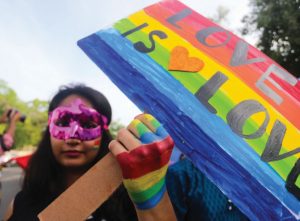 Since April 2018 when the government had amended Income Tax rules to allow transgenders to be recognised as an independent category of applicants for obtaining a Permanent Account Number (PAN) for their tax-related transactions, things have been moving in positive direction for this important segment of the society.
Since April 2018 when the government had amended Income Tax rules to allow transgenders to be recognised as an independent category of applicants for obtaining a Permanent Account Number (PAN) for their tax-related transactions, things have been moving in positive direction for this important segment of the society.
On April 23 this year, the Madras High Court bench had held that as per the Hindu Marriage Act, a transsexual is also a “bride” and the term would not necessarily refer only to a woman. Justice G R Swaminathan gave the ruling on a petition filed by a man and a transwoman who approached the court after officials refused to register their marriage held in Tuticorin last October.
Allowing the petition, he directed the Registration Department officials to register the marriage of the petitioners. Voicing concern over the plight of transgender people, who, he said, suffered from stigma and are forced to leave their homes, the judge directed the Tamil Nadu government to issue an order banning sex reassignment surgeries on inter-sex infants and children.
Quoting from epics Mahabharatha and Ramayana, as well as from Supreme Court rulings, the judge said the word ‘bride’ could not have a static or immutable meaning and would have to include a transwoman. He rejected the contention of the government advocate that the registrar of marriage had powers to refuse the registration as the couple did not meet the statutory requirement under the Hindu Marriage Act, as the term “bride” could only refer to a “woman on the marriage day”.
The judge said the apex court had held that transgender persons had the right to decide their self-identified gender. Justice Swaminathan said it was the responsibility of the government to launch a sustained awareness campaign and encourage parents not to see the birth of an inter-sex child as a matter of embarrassment or shame. “Any inter-sex child is entitled to stay within the fold of its family. The running away to the margins and beyond is a fatal journey and must be arrested. Time has come when they should be brought to the mainstream,” he said.
In the present case, the petitioners were an inter-caste couple and eligible for financial incentives under the Dr Ambedkar scheme for social integration, he said.
In another recent development, 15 trans-women got married at a function in Chhattisgarh, said to be the first such event for the transgender community in the country. It was conceived by Raipur-based transgender and social activist Vidya Rajput and her team. Of the 15 couples who tied the knot, seven were from Chhattisgarh, two each from Gujarat, Madhya Pradesh and Bihar, and one each from Maharashtra and West Bengal.
The marriage procession was taken out from Ambedkar Bhawan in Civil Lines to Pujari Park. Transgenders suffer loneliness and a kind of social boycott, Rajput said. “Therefore, we decided to organise mass marriage for transgenders to send a message to people that like other citizens we also have the right to be loved and get married,” she said. “On Valentine’s day this year, we met transgenders who were in relationship with men but had not got married. We also contacted such couples from other states,” Rajput added.
In 2014, the Supreme Court recognised transgenders as a “third gender” and ensured that they enjoy constitutional rights and freedom, following which the couple decided to live together openly.
Most recently, some 250 members of the transgender community voted for the first time in the Lok Sabha election in Vadodra. Anju Masi, resident of Baranpura locality, said thanks to the district administration’s initiative, members of the community living in the area enrolled as voters this time and got i-cards. “We voted in a Lok Sabha election for the first time today,” she said.
Vadodara district collector Shalini Agarwal reportedly said that members of the transgender community were enrolled as part of the Election Commission’s directive that no eligible person should be deprived of the right to vote.
When it comes to law, everyone is equal. According to an RTI, more than 73,000 transgenders have been arrested for extorting money from railway passengers in the past four years, with over 20,000 alone last year.
The Railway Ministry data assumes significance as passengers have complained of harassment by transgenders who often board trains and extort money from them. Some of these passengers also had to face abuses, in the worst cases of physical assault, in case they refused to give in to such demands. The Railway Protection Force (RPF), according to officials, has been regularly conducting special drives to check such instances.
In the reply to the RTI query, the railway ministry said a total of 73,837 transgenders were arrested during 2015 and till January this year while extorting money from passengers. Of these, a total of 13,546 were arrested in 2015, 19,800 in 2016, 18,526 in 2017 and 20,566 in 2018, it said. As many as 1,399 transgenders were arrested in January this year, the ministry said. “Policing on railways being a state subject, prevention of crime, registration of cases, their investigation and maintenance of law and order in railway premises as well as on running trains are the statutory responsibility of the state governments, which they discharge through the Government Railway Police (GRP),” it said.
Last year, the Central Board of Direct Taxes (CBDT), which frames policy for the department, had issued a notification yesterday that provides a new tick box for the transgenders to apply for the PAN. The notification, issued under sections 139A and 295 of the Income Tax Act, specifies the new application process for obtaining a PAN number by an individual.
Before the move, only male and female gender categories were available to be chosen on the PAN application form. A senior official said the notification amending the tax rules was brought out in view of some representations received by the CBDT in this context.
“Individuals from the transgender community were facing hassles in obtaining a PAN card and this problem was further magnified as Aadhaar had the third gender category but not PAN. “Hence, the transgenders were not able to link their PAN with their Aadhaar due to this anomaly,” the official said. The amendment will now be reflected in Form 49A (PAN application form for Indian citizens) and 49AA (PAN application form for individuals not a citizen of India), the official added.
PAN is a 10-digit unique alphanumeric number alloted by the I-T department to individuals and entities. The government has now made quoting of Aadhaar mandatory for filing income tax returns (ITRs) as well as obtaining a new PAN. Section 139 AA (2) of the Income Tax Act says that every person having PAN as on July 1, 2017, and eligible to obtain Aadhaar, must intimate his Aadhaar number to the tax authorities. As per updated data till March 5, over 16.65 crore PANs, out of the total about 33 crore, have been linked with Aadhaar. The deadline to link these two has been extended recently till June 30 by the CBDT.
letters@tehelka.com












